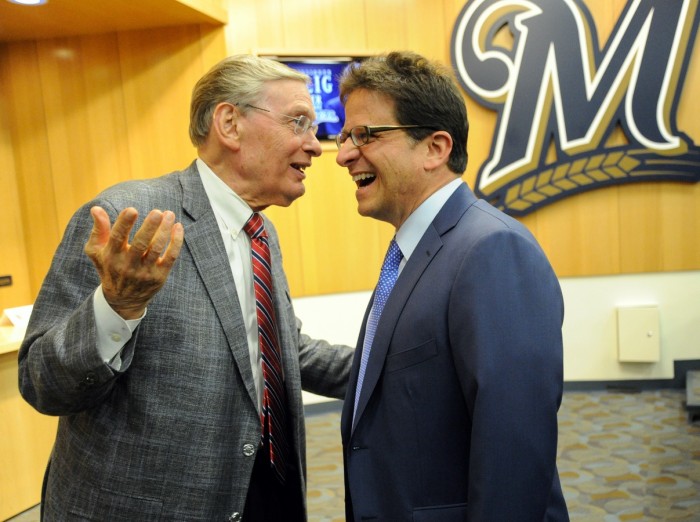Over the past 30 years, no single person has made more noise about the plight of small-market teams than Milwaukee’s own Bud Selig. Whether as baseball’s commissioner or the owner of the Milwaukee Brewers, Selig has acted as a small-market evangelist, preaching the impending doom of Major League Baseball should the game’s economic system not be fixed to tilt the scales more towards franchises in smaller cities like his Brewers.
These days, small-market logic is pretty well accepted as common sense. Revenue sharing programs have become standard for American sports leagues. In baseball in particular, all number of measures, from the luxury tax to hard slots for draft signing bonuses to caps on international spending, have been adopted in the name of supporting small-market teams in their uphill battle against the league’s financial titans in the nation’s largest cities. (Whether or not they actually work is another question, one I’ll cover in this space in more detail later.)
This has not always been the case. In 1985, Major League Baseball went through its shortest strike in its history, a mere two days. The issues centered around restrictions to salary arbitration; specifically, the owners wanted to increase the amount of service time needed before arbitration (from two to three years) and a cap of double the player’s previous year’s salary on arbitration awards. The result was a compromise: the owners ditched the cap, but won the third year before salary arbitration kicked in, giving small-market franchises like the Brewers an opportunity to keep homegrown stars at the league minimum salary for 150 percent as long as before.
“Everybody on the PRC (the owners’ Players Relations Committee) knew there had to be meaningful modifications in the arbitration system or we were in trouble. And finally the union realized it,” Selig told the Milwaukee Sentinel after the strike in August 1985. “These negotiations were a fight for the Milwaukees of the world.”
Selig went on to admit, “In the end, Milwaukee was the only franchise being mentioned. These negotiations were terribly important for this city and this franchise.”
The article also describes Selig as “often termed the lone wolf howling about the finanical stability of the game” and states that he “described the negotiations as the salvation of smaller markets.” My search through the Google News archives did not find any earlier discussions of Selig and the plight of small-market teams. Perhaps it was harder to grab the press’s ear when his “lone wolf” reputation was fiercer.
The 1985 season was critical in the history of Major League Baseball’s labor relations. Despite Selig seeing his mission of helping small-market franchises as “accomplished,” per the Sentinel, a number of owners were extremely dissatisfied with the strike’s aftermath and with Commissioner Peter Ueberroth’s role in the negotations in particular. “He’s a no-good s.o.b,” an NL owner said of Ueberroth. “We could have gotten the whole thing but Ueberroth forced the settlement for his personal benefit.”
One American League owner agreed, saying, “We got the bad end on the arbitration, no question.” Another loss in the labor battle was hardly what the owners wanted to see after the league’s average salary had risen from $44,676 in 1975 to $371,157 in 1985 thanks to the union’s repeated victories on issues like arbitration and free agency.
The next step for the owners was to collude to keep player salaries down, as player movement dropped substantially over the next three seasons as owners agreed not to submit offers on other clubs’ free agents. When the three collusion cases brought against baseball in the late 1980s were finally settled in 1990, owners paid the players $280 million in damages. Fay Vincent, the commisioner deposed by Bud Selig and the coalition of owners he built in 1992, would later blame the massive 1994-95 strike on what he called player anger at “a $280 million theft by Selig and [White Sox owner Jerry] Reinsdorf.” It’s an important point, but it’s also important to remember it goes both ways — there was clearly a good deal of owner anger directed at the players for the audacity of believing they deserved their share.
Arguably nobody represented this anger more than Selig, even if he managed to smartly disguise it under the rhetoric of protecting small-market franchises like his own. It’s hard to believe that just 30 years ago, and less than a decade before Selig’s rise to the commissionership, his way of thinking was considered outlandish, crazy, and made him a “lone wolf.” It was Bud Selig vs. The World, as ludicrous as that may seem after seeing him and his small-market-centric approach rule the commissioner’s office for over two decades.
